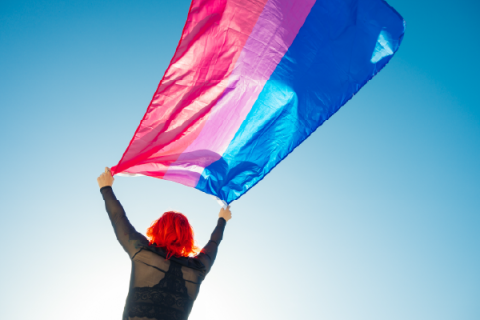

Read this anonymous story about how swimming can provide a sense of strength and peace
Our caring about not caring campaign begins with stories from Team UOP member's. This campaign aims to provide insight into the lives and experiences of members of the LGBTIQA+ community. These honest and frank stories are an example of how sport and physical activity can play a part in providing a sense of belonging and combating feelings of anxiety. We want to raise awareness of these stories and of the issues they look to challenge. These personal stories are powerful and should start up conversations between you and your friends, family and teammates. We have also supplied a number of resources below if you are affected by this story.
Story by anonymous
Tell us about you and your sport
So, growing up from the age of 5 I was a swimmer. I competed up the levels from counties, regionals and nationals and then gave up swimming a few years ago. I love my sport because it taught me discipline and organisation and also taught me how to look after myself. I battled a good fight with my asthma whilst growing up and being sick a lot in hospital and having to fight to keep my place in the ranks whilst recovering from being sick was a big memory of mine. I’ve started to get back in the pool recently since joining the uni to help support my job as well as for fitness, and it has brought back all the memories of why I started swimming in the first place - the feeling of strength and peace.
Have you ever felt or experienced a negative situation due to your sexuality/gender identity within your sport, and how did the people around react?
Growing up in swimming meant I built the physique of a swimmer including the broad shoulder and stocky build over time. I remember being bullied for looking butch in school and being stereotyped by being a girl who loved sports, and it definitely had an impact on me being able to come out after feeling like I didn’t want my bullies to be right, or to fit into anyone's stereotypes of what they think a bisexual person would be like. I carried that denial through till I was about 16 and came out in college after I left swimming. I think at a young age kids feel the need to fit in and school was an environment that enabled cliques to form and being the odd one out was something I dreaded, so after going through that I knew that I wanted to become someone that people could always come to and feel comfortable around. I think it's important that as adults we learn that life is different in the ‘real world’ and having a supportive outlook on other people's choices even if you may disagree is so important - especially in sport as it's an environment based on teamwork and supporting each other to be the best.
Coming out is personal and different for everyone, there is no right or wrong way to come out and you must do it when the time is right for you. Some people are comfortable talking openly about their sexual orientation and gender identity. Others may decide not to be ‘out’ with certain groups or in every context and some people decide not to ‘come out’ to anyone, ever. Coming out is rarely a once-in-a-lifetime event, as many LGBT+ people may want or need to come out to each new person they meet, or may realise different aspects of their LGBT+ identity over time which they might then choose to tell people about. Coming out can be difficult and takes courage, as you never know how other people are going to react, but the most important person to come out to first is yourself. When you decide to tell friends and family about your identity, it is important you do not put pressure on yourself to come out.
NHS , https://sybhealthiertogether.nhs.uk/health-for-young-people/lgbt/coming-out
What do you think teams/sport members can do better to make their LGBTIQA+ team mates feel safer within their sport?
A big thing for me when I started working at the university was worrying about people's reactions when I told them. Luckily everyone has been great - but I'd say to other people to try not to act surprised when someone tells you their sexuality or watch your wording when asking questions as it can backtrack progress that person has made to be comfortably open. Have a conversation and address any questions from both sides to make everyone feel comfortable. Being a swimmer and being bisexual I never wanted to make any of my friends feel uncomfortable changing around me or being affectionate when celebrating wins and losses. I made sure to tell them that if they had any concerns to talk to me but just because I liked girls as well didn't mean I liked every girl I saw. Everyone was accepting and had no issues but I think communication is key to making everyone feel understood.
If you could meet your younger self what advice would you give you?
I’d say that other people honestly don’t care as much as you think they do. I struggled coming out to friends (and still haven't come out to everyone), but when I did I received the best reaction possible. I’d also tell myself that times are changing, albeit it isn’t a smooth road. The majority of people will be open and accepting to any conversation or personal feelings about your sexuality. And there is nothing wrong with being in denial. After I finally came out, I struggled with the fact I had rejected that I was attracted to girls for so long. Now looking back I had no reason to resent myself, I was young and confused because I focused too heavily on the negatives and what other people would think. It’s your life, you should put yourself and your happiness first. It’s okay for other people not to accept you but you shouldn't let them stunt your growth as a person.
If you need some support with your mental health at this time, the student wellbeing service has a number of resources to help.

